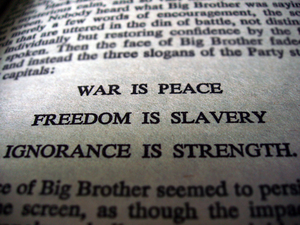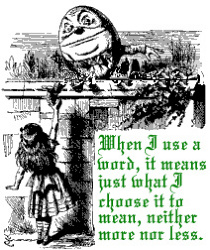WORDS HAVE MEANING
2013 August 11
 About twenty-five years ago
I remember debating some technological points about
the new, sloppy wave of computer software.
I noticed the people who defended this new approach
used the same words that we did,
words like
"flexible," "documented," "consistent," and "maintainable,"
with totally different meanings.
It was frustrating having a system with six completely-different
regular-expressions parsers written by six different people
with six different sets of rules
defended as "consistent."
When I came from, the word "consistent" simply didn't mean that.
I realized that we had a brave new world in computers
where verbal discussion didn't communicate anything useful.
About twenty-five years ago
I remember debating some technological points about
the new, sloppy wave of computer software.
I noticed the people who defended this new approach
used the same words that we did,
words like
"flexible," "documented," "consistent," and "maintainable,"
with totally different meanings.
It was frustrating having a system with six completely-different
regular-expressions parsers written by six different people
with six different sets of rules
defended as "consistent."
When I came from, the word "consistent" simply didn't mean that.
I realized that we had a brave new world in computers
where verbal discussion didn't communicate anything useful.
I found the same thing in job recommendations for technical positions.
People described as "reliable" were flakes,
people described as "knowledgeable" hadn't a clue, and
people described as "brilliant" were dumber than
rocks.
I don't know if my word-twisting colleagues
are truly as ignorant and bewildered as they seem
or if they are deliberately using words with loaded values
to miscommunicate.
In either case,
they undermine our ability to reach logical, correct conclusions.
We're seeing the same in politics.
I believe the consequences of the would-be misinterpretations
of common language to be dire and devistating.
Given that "fair" and "just" and are good
and that "stealing" and "racism" are bad,
using those terms as complete opposites of their correct meanings
is malicious manipulation of the medium of managing ideas.
 Eric Blair (under the pseudonym George Orwell)
wrote of this verbal assault on meaning in his famous book
1984.
He described the Ministry of Truth that tells lies
and the Ministry of Love that tortures people.
Between them we have our own Ministry of Fairness,
the "Equal Employment Opportunity Commission" (EEOC),
that arbitrarily decides who gets which jobs,
typically meeting race quotas.
Eric Blair (under the pseudonym George Orwell)
wrote of this verbal assault on meaning in his famous book
1984.
He described the Ministry of Truth that tells lies
and the Ministry of Love that tortures people.
Between them we have our own Ministry of Fairness,
the "Equal Employment Opportunity Commission" (EEOC),
that arbitrarily decides who gets which jobs,
typically meeting race quotas.
A "Peacekeeper" is a bomb,
our "Defense" department starts wars,
"Social Security" is a Ponzi scheme,
an "Affordable Care Act" act makes healthcare more expensive,
and there are oodles more.
What I'm writing about is something deeper,
it's about complete misrepresentation
of the meaning of descriptive terms.
The difference between civilized and savage
is how people understand fundamental notions like
fairness, right and wrong, and ownership.
It's not about generosity or greed.
It's not about religion or science.
It's not even about honesty or corruption.
It's about property and theft,
it's about boundaries,
it's about common values,
and it's about what is okay to do to another person and what is not.
"Fair" is a great word.
Anything that's "fair" has to be good, doesn't it?
When and where I come from,
"fair" means those who do right things have good outcomes.
Building enterprises that
produce wealth, feed the hungry, create jobs, and reduce poverty
used to be one of those right things,
and the good outcome is living well.
"Fair" means those who do good should do well,
working hard and creating wealth is doing good,
and doing well is enjoying the fruits of that labor.
It's also "fair" that
those who work in those enterprises also get paid and do well.
So when did "fair" give one person a claim on another?
"Fair" in liberal-left speak seems to mean
it's okay for good people to take what they want from bad people.
It may have to go through a morality-laundering step
of elections and tax collectors,
but it's basically okay for the bad people to lose what they have.
Of course,
the people tauting "fair" redistribution
get to decide who the good people are and who the bad people are.
Usually, the left-wing liberals and their causes are the good people
and, for some reason,
those who work hard and become successful are the bad people.
We always thought taking from somebody else is "stealing,"
a bad word,
but in left-wing, liberal Newspeak,
people who are successful through their own efforts
and achieve a prosperous lifestyle are "stealing,"
which makes them bad people.
When they create jobs, hire people, and sign paycheques,
these successful people are said to be "exploiting" their employees.
When and where I come from,
"racism" meant judging people by their race (usually skin color)
rather than by character, ability, talent, or something like that.
Schools would admit students and companies would hire candidates
based on enthnicity and skin color.
Of course "racism" is a bad thing.
In the new vocabulary, using race to allocate positions
(school admissions or jobs)
is called "equal opportunity" or "affirmative action"
while those who believe in race-blind, quality-based choices of people
get the R-word.
It' s gone further than that.
Anybody who points out any racial inequality is "racist" now.
I asked a liberal friend what he thought was the reason
why forty years of Affirmative Action still left
black people so far behind
(even further than when it started, actually),
whether he thought it was a genetic or cultural difference,
and he exploded.
The very question was off limits,
clearly "racist" even in the asking.
There were discussions forty years ago about IQ-test
and achievement-test scores of blacks versus whites
and conversations about culture
that are off limits today,
all considered too "racist" to confront.
When I was young, a "fact" was an observation.
We might differ on reasons and motivations,
but "facts" were things we could mutually observe.
You may think a volcanic eruption is from global warming
or republican racism,
I may think it's from magma displacement in the earth,
but we both agree that a bunch of hot air, soot, and lava
came out of a mountaintop at a particular time and place.
A liberal friend posted a web page on global warming
claiming he was printing "facts,"
and each "fact" was an essay attributing some effect
to global warming or climate change.
Even the observations aren't repeatable anymore
as fudged data and selected samples have become
a comfortable part of the so-called "scientific" process.
Now there's a great word: "science."
The Obama presidency vowed to be responsive to "science"
in its policies.
That's good because fifteen years of not-changing temperatures
and not-rising sea levels,
not to mention some record-setting cold winters,
has removed global warming from the scientific category
and placed it firmly in the political-kickback zone.
That's even better because the politics of global warming,
now "climate change" when
the original scientific predictions didn't happen,
have diverted corn from
feeding about one hundred million people in Latin America
to making ethanol that rots out the rubber hoses and
lowers the fuel mileage in our cars.
Alas, when the real science in global warming was clearly gone,
the Obama administration continued
on its destructive, "scientific" path.
There are still liberals who believe in this so-called "science"
and are taking resources from legitimate environmental issues
(water distribution, pesticides,
phosphate fertilizer pollution, et cetera).
When did "freedom" allow forced union membership to get a job?
When did "liberty" allow forced racial quotas enforced by government?
When did "justice" allow taking from productive, hard-working people
to subsidize people, often well-to-do people,
who don't feel like working?
When did "for all" mean such a limited inner-party circle
of corrupt politicians preaching about democracy?
 Elsewhere in these essays I make the points
about left-wing, liberal politics being destructive
savagery
and its adherents being confused and dangerous.
That's not my point here.
My point here is that we're not going to win
the battle for civilization against savagery
with a contest of words,
not when Humpty Dumpty
can change the meanings of words on the fly.
When fair is unfair, science is based on faith,
stealing is not bad when good people do it,
and people who support racial quotas are not racist,
there isn't a foundation for verbal discourse about issues.
(In other words,
if we can't agree that pigs oink and cows moo,
or that pigs moo and cows oink,
then it's hard to determine if pork is unhealthy.)
Elsewhere in these essays I make the points
about left-wing, liberal politics being destructive
savagery
and its adherents being confused and dangerous.
That's not my point here.
My point here is that we're not going to win
the battle for civilization against savagery
with a contest of words,
not when Humpty Dumpty
can change the meanings of words on the fly.
When fair is unfair, science is based on faith,
stealing is not bad when good people do it,
and people who support racial quotas are not racist,
there isn't a foundation for verbal discourse about issues.
(In other words,
if we can't agree that pigs oink and cows moo,
or that pigs moo and cows oink,
then it's hard to determine if pork is unhealthy.)
When did it become "generous" to give away something
one doesn't own and contributed no part in creating?
When did it become "greedy" to want to keep
that which one does own and worked hard for?
When did supporting evil dictators and tin-pot tyrants
become "defending our country"?
The people I know who support these things
are comfortable with what they're supporting
because "generous" is good,
"greedy" is bad,
and "defending our country" is a positive force.
It's a battle of words where one side feels
no accountability to the true meanings of those words,
just like in the book 1984.
They're not lying, they're just using words differently
than we do.
Without a verbal foundation and consistent meanings of words,
the notion of commitment and keeping promises goes out the window.
It's hard to talk about honesty when we don't know what we mean
by the words we use.
It means we're not going to settle our political issues
with any kind of rational discussion.
If we working people want to stop the spending of our wealth
by the other half,
then we'll have to stop it some other way.
If we want to get back some of what of ours they spent,
then we'll have to get it back some other way.
Additionally,
and finally,
with words not meaning what they mean,
a moral compass doesn't mean much either.
Caring only works if there's a consistent concept
of something good to care about.
If you want more of this kind of material,
then
here
are my American-issues essays.
THE ADAM HOME PAGE
adam@the-adam.com
 About twenty-five years ago
I remember debating some technological points about
the new, sloppy wave of computer software.
I noticed the people who defended this new approach
used the same words that we did,
words like
"flexible," "documented," "consistent," and "maintainable,"
with totally different meanings.
It was frustrating having a system with six completely-different
regular-expressions parsers written by six different people
with six different sets of rules
defended as "consistent."
When I came from, the word "consistent" simply didn't mean that.
I realized that we had a brave new world in computers
where verbal discussion didn't communicate anything useful.
About twenty-five years ago
I remember debating some technological points about
the new, sloppy wave of computer software.
I noticed the people who defended this new approach
used the same words that we did,
words like
"flexible," "documented," "consistent," and "maintainable,"
with totally different meanings.
It was frustrating having a system with six completely-different
regular-expressions parsers written by six different people
with six different sets of rules
defended as "consistent."
When I came from, the word "consistent" simply didn't mean that.
I realized that we had a brave new world in computers
where verbal discussion didn't communicate anything useful.

